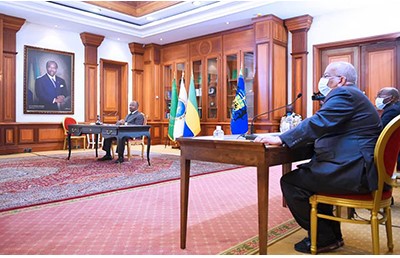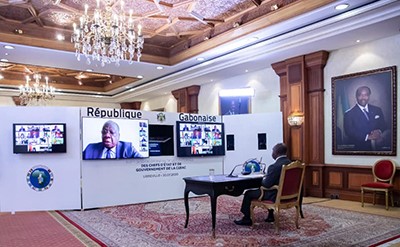Ali Bongo Satisfied With Evolution Of The 11 Member State ECCAS Treaty

The Economic Community of Central African States (ECCAS) which was founded on October 18, 1983 with headquarters in Libreville, Gabon held its first ever video heads of state conference yesterday with its current president Ali Bongo Ondimba, president of Gabon, presiding.
The 17th session of the ECCAS heads of state summit, which was held in Libreville, was forced to avoid personal contact because of the COVID-19 pandemic.
The main thrust of the conference was on institutional reforms, the adoption of the regional strategy for the fight against the COVID-19 pandemic and the appointment of members of the ECCAS Commission which replaces the General Secretariat.
The reforms were adopted during the December 2019 session of the Council of Ministers and the meeting comes five years after the last heads of state summit that was held in N’Djamena, Chad.
Speaking during the videoconference, President Ali Bongo said he was overwhelmed by this first videoconference of ECCAS.
He revealed that “the revised treaty, which we adopted in December 2019 in Libreville, is as of today ratified by several members and its eminent entry into force would mark the putting into place of the ECCAS Commission” which replaces the General Secretariat.
President Bongo called on leaders of the sub region to be gladdened by the consensual spirit that prevailed in the choice of members of the Commission.
He added that “the members of the Commission which replaces the General Secretariat, were appointed, which is a sign that the historic reforms adopted in December 2019 are little by little entering into force”.
He recalled that it was on May 25, 2015 in N’Djamena that the decision to proceed with institutional reforms of ECCAS was taken and he assigned the mission of conducting the said reforms with a view to rendering the Community “more efficient to live up to the challenges for which it was created, notably those related to regional integration and development”.
“Today, we can be happy for the path already covered leading to the present results… I reiterate my congratulations to the General Secretariat of our communal institution, as well as its collaborators for their support throughout the process of this institutional reforms.
“This session by videoconference is the first of its kind in the 37 years of existence of our Community and it is historic, thanks to the imminent entry into force of the revised treaty”, the Gabonese head of state declared.
It should be recalled that the ECCAS groups together Angola, Burundi, Cameroon, Central African Republic, Chad, Congo, Democratic Republic of Congo Brazzavile, Equatorial Guinea, Gabon, Rwanda and Sao Tome and Principe. Its official languages are French, Portuguese and Spanish.
It is different from the Central African Economic and Monetary Commission which groups six countries of the Central African sub region with headquarters in Bangui, the capital of the Central African Republic.
The posts of ECCAS commissioners decided upon yesterday in Libreville were assigned to countries not individuals as follows:
Angola was assigned the post of Commission President and the country nominated Gilberto da Piedade Verissimo to fill the post;
The post of Vice President went to Equatorial Guinea which would appoint who to fill it.
The post of Commissioner for Common Markets, Economic, Monetary and Financial Affairs goes to Rwanda.
Chad was given the post of Commissioner for Political, Peace and Security Affairs.
Congo Brazzaville gets the post of Commissioner for Environment, Natural Resources, Agriculture and Rural Development.
The Democratic Republic of Congo was allocated the post of Commissioner for Gender Promotion, Human Development and Social Affairs.
Cameroon got the post of Commissioner for Territorial Development and Infrastructure to which Marie Therese Chantal Mfoula has been appointed.
Support Our Journalism
There are millions of ordinary people affected by conflict in Africa whose stories are missing in the mainstream media. HumAngle is determined to tell those challenging and under-reported stories, hoping that the people impacted by these conflicts will find the safety and security they deserve.
To ensure that we continue to provide public service coverage, we have a small favour to ask you. We want you to be part of our journalistic endeavour by contributing a token to us.
Your donation will further promote a robust, free, and independent media.
Donate HereStay Closer To The Stories That Matter





